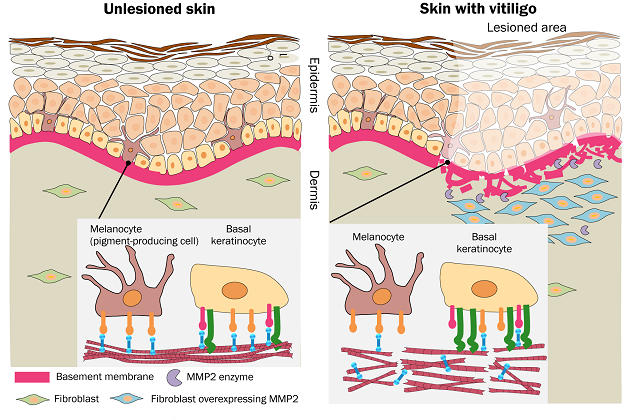Research News
Sep 9, 2024
- Medicine
Loss of skin’s pigment-producing cells could be related to basement membrane disruption
Suppression of an enzyme might allow melanocytes to recover
Disappearance of pigment-producing cells in vitiligo
A graphical representation illustrates what might be occurring in undamaged and damaged skin.
Credit: Osaka Metropolitan University

Skin pigmentation disorders affect people across the world. One of them, vitiligo, is said to have a worldwide incidence of 1-2%. What causes the loss of pigmentation in vitiligo has long been unclear, but an Osaka Metropolitan University-led team has uncovered clues to the mechanism behind the disorder.
In findings published in The Journal of Pathology, Graduate School of Medicine Specially Appointed Associate Professor Lingli Yang, the corresponding author, and researchers including Specially Appointed Professor Ichiro Katayama found that disruptions to the basement membrane zone between the epidermis and dermis could be making it harder for pigment-producing cells to adhere to the affected zone.
They also discovered an overexpression of an enzyme in vitiligo-affected skin. Too much of this enzyme, matrix metalloproteinase 2 (MMP2), might be causing the disturbance to the basement membrane.
An experiment using model mice with vitiligo-like depigmentation showed recovery of pigment-producing cells when MMP2 was suppressed.
“The results of this study potentially provide a new method for the treatment of vitiligo,” Professor Yang suggested. “In particular, by suppressing MMP2, the hope is that pigment-producing cells will return to the skin.”
Paper information
Journal: The Journal of Pathology
Title: Disorganisation of basement membrane zone architecture impairs melanocyte residence in vitiligo
DOI: 10.1002/path.6321
Authors: Fei Yang, Lingli Yang, Yasutaka Kuroda, Sylvia Lai, Yoshito Takahashi, Tetsuya Sayo, Takeshi Namiki, Kimiko Nakajima, Shigetoshi Sano, Shintaro Inoue, Daisuke Tsuruta, Ichiro Katayama
Published: 11 July 2024
URL: https://doi.org/10.1002/path.6321
Contact
Lingli Yang
Graduate School of Medicine
Email: yang.lingli[at]omu.ac.jp
*Please change [at] to @.
SDGs
